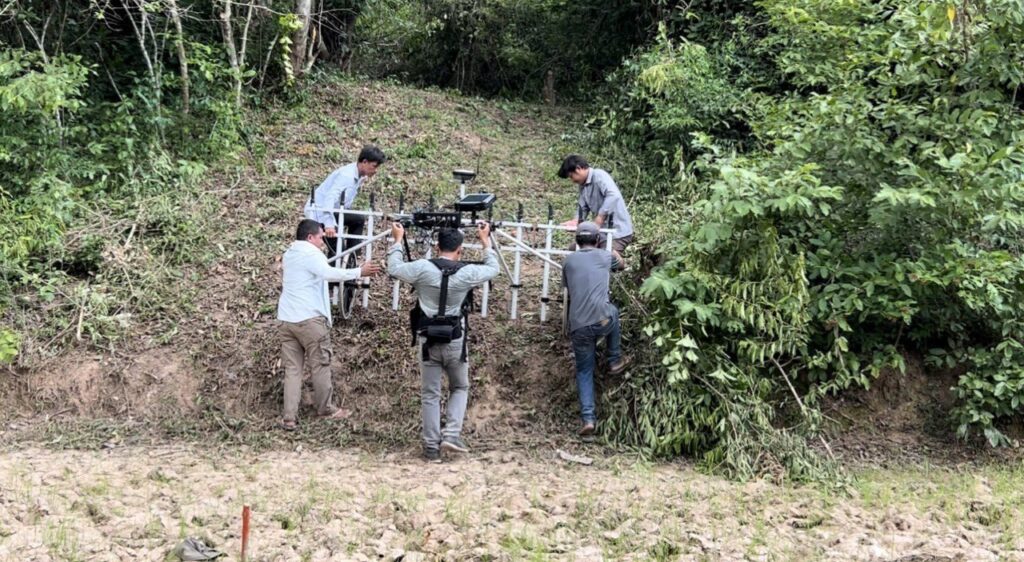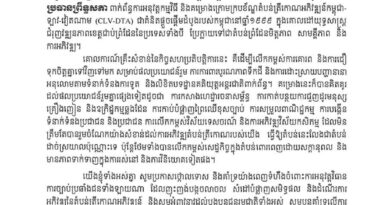អាជ្ញាធរជាតិអប្សរា ដែលសហការជាមួយសាកលវិទ្យាល័យហាវ៉ៃនិង Flinders University ដោយប្រើឧបករណ៍ វាស់ស្ទង់រករចនាសម្ព័ន្ធឡដុតកុលាលភាជន៍នៅខ្លោងទ្វារដីឆ្នាំងនៃអង្គរធំ បានរកឃើញថាមានឡដុតកុលាលភាជន៍ជាច្រើននៅជ្រុងពាយព្យនាភូមិនគរក្រៅ សង្កាត់គោកចក នៃក្រុងសៀមរាប ខេត្តសៀមរាប។
បណ្តុំក្រុមឡដុតកុលាលភាន៍ទាំងនោះ ស្ថិតនៅលើទួលធំវែងមួយកន្លែង ដែលលាតសន្ធឹងពីកើតទៅលិចប្រវែង២៣០ម៉ែត្រនិងទទឹងមានប្រវែង៨៤ម៉ែត្រ កម្ពស់ប្រហែល២,៧០ម៉ែត្រ។ ទួលនេះសន្ធឹងស្របគ្នានិងកំពែងនៃកសិន្ធុទឹកភាគខាងជើងផ្នែកខាងលិច របស់ខ្លោងទ្វារដីឆ្នាំងនៃអង្គរធំ មានចម្ងាយ១២៣ម៉ែត្រពីខ្លោងទ្វារដីឆ្នាំង។
លោក ទិន ទីណា អនុប្រធាននាយកដ្ឋានស្រាវជ្រាវ បណ្តុះបណ្តាល និងផ្សព្វផ្សាយ មានប្រសាសន៍ថា ក្រោយពីបានចុះពិនិត្យផ្ទៀងផ្ទាត់ និងស្រង់ទិន្នន័យបុរាណវិទ្យា ដោយក្រុមអ្នកស្រាវជ្រាវនៃនាយកដ្ឋានស្រាវជ្រាវ បណ្តុះបណ្តាល និងផ្សព្វផ្សាយនៃអាជ្ញាធរជាតិអប្សរា បានរកឃើញថាមានទួលឡដុតកុលាលភាន៍មានចំនួន២៥ដែលពុំទាន់មានការធ្វើកំណាយស្រាវជ្រាវ ដើម្បីបញ្ជាក់ថាទីនេះជាអ្វីពិតប្រាកដនៅឡើយទេ គ្រាន់តែអ្នកស្រាវជ្រាវមួយចំនួនបានរើសយក អំបែងភាជន៍យកទៅសិក្សាតែប៉ុណ្ណោះ។ ទើបតែកាលពីឆ្នាំ២០២០ និងឆ្នាំ២០២២ ក្រុមអ្នកស្រាវជ្រាវនៃ អាជ្ញាធរជាតិអប្សរា បានធ្វើកំណាយលើទួលឡនោះចំនួនពីរ ដើម្បីប្រមូលទិន្នន័យដែលអាចឱ្យអ្នកជំនាញបញ្ជាក់ថា ទីតាំងនេះជាអ្វីឱ្យពិតប្រាកដ?។
យោងតាមលទ្ធផល ដែលទទួលបានពីការធ្វើកំណាយទាំងពីរលើកកន្លងមក បានបញ្ជាក់ថាទីតាំងនេះជាឡដុតកុលាលភាជន៍នៅក្នុងតំបន់អង្គរ ដែលចាប់ដំណើរការតាំងពីពាក់កណ្តាលសតវត្សរ៍ទី១២ និងឈប់ដំណើរការនៅដើមសតវត្សរ៍ទី១៥នៃគ្រីស្តសករាជ។ ក្រុមអ្នកស្រាវជ្រាវមានគោលបំណងពង្រីកការស្រាវជ្រាវពីបណ្តុំឡដុតកុលាលភាជន៍នេះឱ្យបានវែងឆ្ងាយទៅទៀត ហើយថ្មីៗនេះ អ្នកស្រាវជ្រាវនៃនាយកដ្ឋានស្រាវជ្រាវ បណ្តុះបណ្តាលនិងផ្សព្វផ្សាយអាជ្ញាធរជាតិអប្សរា បានសហការជាមួយសាកលវិទ្យាល័យហាវ៉ៃ និង Flinders University បានប្រើឧបករណ៍វិទ្យាសាស្ត្រទំនើបដើម្បីវាស់ស្ទង់រករចនាសម្ព័ន្ធឡដុតកុលាលភាជន៍នៅតំបន់ទ្វារដីឆ្នាំងនៃអង្គរធំនេះ ដោយប្រើឧបករណ៍ Magnetometer ដើម្បីស្វែងរកសញ្ញាណម៉ាញ៉េទិកនៃរចនាសម្ព័ន្ធឡ។ ក្រុមអ្នកស្រាវជ្រាវបានចាត់ទុកថាទិន្នន័យ ដែលទទួលបានពីការវាស់ស្ទង់នេះ គឺមានសារសំខាន់សម្រាប់អ្នកជំនាញយកធ្វើជាមូលដ្ឋានក្នុងការធ្វើកំណាយស្រាវជ្រាវឡដុតកុលាលភាជន៍នៅតំបន់នេះតទៅថ្ងៃមុខទៀត៕
អត្ថបទនិងរូបភាព៖ នាយកដ្ឋានស្រាវជ្រាវ បណ្តុះបណ្តាល និងផ្សព្វផ្សាយ
National and international researchers discovered that the ceramic kilns in the Angkor area have been in operation since the mid-12th century.
The ceramic kiln at Dei Chhnang Gate is located at the northwest corner of Angkor Thom in Nokor Krao Village, Sangkat Kork Chak, Siem Reap City, Siem Reap Province. The kiln cluster is located on a large mound stretching from east to west, 230 meters long, 84 meters wide, and about 2.70 meters high. This mound is parallel to the wall of Angkor Thom, 123 meters from the Dei Chhnang Gate (Northern Gate). This is confirmed by Mr. Tin Tina, Deputy Director of the Department of Research, Training, and Communication.
Mr. Tina added that after inspecting, verifying, and extracting archaeological data by the researchers from the Department of Research, Training, and Communication of APSARA National Authority, they found 25 mounds, which had not been excavated before. To prove what this is, only a handful of researchers have selected pottery fragments to study. Therefore, in 2020 and 2022, researchers from the APSARA National Authority excavated two mounds to collect data that would allow experts to confirm that this location is a kiln site.
As a result of these two excavations, it was confirmed that the site was a ceramic kiln in the Angkor area, which had been in operation since the mid-12th century and ceased to function in the early 15th century. To expand the research of this ceramic kiln, researchers of the APSARA National Authority have recently partnered with the University of Hawaii and Flinders University to locate the structure of the ceramic kiln at Angkor Thom’s Dei Chhnang Gate (Northern Gate) using a magnetometer (to find the magnetic signal of the kiln structure). The data obtained from this measurement is important for experts to be the basis for excavating and researching this ceramic kiln in the future.
Article and Photos: Department of Research, Training, and Communication





